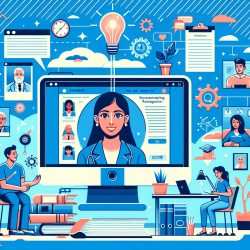As a practitioner in the field of special education, you're likely always on the lookout for innovative methods to enhance your practice and better serve your students. One such method gaining traction is the use of real-time video counseling. A recent systematic review titled Effectiveness of Individual Real-Time Video Counseling on Smoking, Nutrition, Alcohol, Physical Activity, and Obesity Health Risks offers compelling evidence that video counseling can be a highly effective tool for addressing various health risks.
Key Findings from the Research
The review analyzed 13 studies and found that video counseling is potentially more effective than control groups or other modes of support in addressing physical inactivity and obesity. It was also found to be equally effective as traditional methods for smoking cessation and alcohol consumption.
- Physical Activity: Video counseling significantly increased physical activity in two studies, showing improvements at both week 9 and after 5 years.
- Obesity: Two studies reported significant changes in BMI and greater weight loss in the video counseling group compared to in-person and control groups.
- Smoking Cessation: One study found that video counseling was more effective than telephone counseling for achieving smoking cessation.
Implementing Video Counseling in Your Practice
Given these promising results, integrating video counseling into your practice could be a game-changer. Here are some steps to consider:
- Invest in Technology: Ensure you have the necessary hardware and software to facilitate high-quality video sessions. Platforms like Skype, Zoom, and Microsoft Teams are commonly used.
- Training and Certification: Make sure you and your staff are trained in delivering effective video counseling. Look for certification programs that can add credibility to your services.
- Develop Protocols: Establish clear protocols for video counseling sessions, including confidentiality measures, session structure, and follow-up procedures.
- Client Engagement: Educate your clients about the benefits of video counseling and how it can be as effective as face-to-face interactions.
Encouraging Further Research
While the current research is promising, further studies are needed to fully understand the long-term benefits and potential limitations of video counseling. As a practitioner, you can contribute to this growing body of knowledge by participating in research studies, sharing your experiences, and advocating for more comprehensive research in this area.
To read the original research paper, please follow this link: Effectiveness of Individual Real-Time Video Counseling on Smoking, Nutrition, Alcohol, Physical Activity, and Obesity Health Risks: Systematic Review.










